- Home
- J. M. Redmann
Women of the Mean Streets Page 12
Women of the Mean Streets Read online
Page 12
“Nope.”
I took a satisfied sip of latte. There was still hope. “Knowing her, she hid it somewhere.” I flashed on an evening I’d recently spent at Edna’s. I’d given her a ride home because her car was in the shop. She’d invited me in for “a nip.” Darrell doesn’t like it when I drink, she’d said. Says it makes me unsteady. But I’ve been having a drink before bed as long as I can remember. She laughed. It’s all part of his plan to make me feel old and feeble. She’d pulled a bottle of malt whiskey from a secret panel in the back of a rolltop desk.
“You got any plans tonight?” I asked Maria.
“I do now.”
Five hours later we were driving down Edna’s pretentious, hedge-lined circle driveway. Her Mercedes was parked out front. We parked behind it and got out for a look. Contents from the glove box were strewn all over the floor. The mess had a violent energy to it.
“Shit,” I said.
“Yeah,” she said.
The door to the car was unlocked, which I found strange—Edna was paranoid as hell—but I used the opportunity to rifle through what was left in the glove box and around the floorboards. I came up empty-handed save for some major second thoughts. Weren’t there laws about breaking into dead people’s cars? Homes? A fleeting hope that Maria might suggest we bag the break-and-enter routine tickled the edges of my brain, but Maria, seemingly undaunted, turned to face the palatial Craftsman-style house. “Shall we?”
“I…uh…figure we should knock first, just in case someone’s here,” I stammered.
“I thought you said she lived alone.”
“She does—did!—but you never know.” I reassured myself that whoever had ransacked her car was probably long gone and started making my way down the slate path.
The knocker on the large red door was in the shape of a gargoyle and about the size of my head. I gave it three loud raps.
We waited.
Maria tried peering through the frosted glass on the side window. “We should go around the back, see if we can find an open door or something.”
“Sounds good.”
A loud bumping sound came from inside the house. We both froze.
“Now what?” I mouthed.
Maria stepped back taking hold of the rail to keep from toppling off the low step.
The door swung open and we were face-to-face with a man who looked to be in his fifties, although he could have been older. His features were grotesquely distorted from too much plastic surgery; his skin barely looked real. A five o’clock shadow dusted a bizarrely chiseled jaw and cleft chin. He was dressed in designer jeans and a man-pink button down, an outfit I’m sure a personal dresser chose. He also was shitface drunk.
“Can I help you?” His upper lip twitched.
Hackles standing at attention, I plunged in. “I…we…were hoping to talk to you about Edna Powell.”
He seemed to remember that he should appear bereft and hit us with a poor-me look. “Yes. Edna. My mother.”
“Ah. You’re Darrel, then. My name is Hattie and this is Maria.” I thrust out my hand to kill some time. “We worked with your mother at the theater.” What the hell were we doing?
Maria jumped in. “We were hoping that maybe when you write Edna’s obituary, you might encourage people to give to the theater.”
I marveled at her invention, adding, “In lieu of flowers. You know how people do.” My heart was pounding so loudly in my chest I could barely hear myself.
“Obituary…” he repeated, his mind clawing through the inebriation.
“As a matter of fact,” I went on, “knowing how consumed you must be with all the details of her death, we thought we might help you…write it.”
“She was very popular in the theater community,” Maria said.
“Yes. And people will expect you to mention some of her more prominent roles.”
He didn’t say anything, just stood there in his alcohol-induced haze, squinting into space as if there were a movie screen above our heads playing a particularly gruesome horror flick.
“Uh, Darrell,” I said. “Could we come in? It’ll just take a minute.”
“Oh. Sure.” He opened the door just wide enough for us to wriggle through.
The place was a mess. Coffee table books were tossed to the floor; a cedar chest gaped open with colorful throws draping out like octopus tentacles; the pillows of the couch and chairs were askew.
He glanced around nervously. “I was, um, packing up some of Mom’s stuff.”
I had the urge to bolt while the door was still open, but Maria strode over to the couch, straightened out the pillows, and sat. She looked small, vulnerable, under the vaulted ceiling and gaudy chandelier.
He shut the door warily then ran his fingers through his hair, obviously implants. He cleared his throat. “Could I get you ladies something to drink?” Although he’d used the word ladies, his sudden politeness was obviously aimed at Maria. He’d apparently sobered up enough to notice she’s a knockout.
“How nice of you to offer,” she said, primping her hair. “I’d love something. What have you got?”
He took the bait and swaggered toward her. “I have a lovely Chateau Ste Michelle or—”
“Sounds great.” She flashed him a flirtatious smile. “I love a man who knows his wine.”
He looked at me still standing by the foyer. “You?”
“Sure.”
I staked a claim next to Maria on the couch. His leering made me nervous. Hell, everything about the scene was making me nervous.
Clearly unsteady on his feet, he took off down the hall for the kitchen.
“Where’s the rolltop?” Maria whispered.
I pointed down the hall. “In the library.”
“Shall we—”
“Not yet. It’s too risky. He’ll pass the library coming from the kitchen.”
“So I’ll follow him into the kitchen and stall him. Come on.”
Before I knew it, she was up out of her seat and trailing after him. I took up the rear, whispering, “Maria! Maria!” But it was no use. She was a woman with a mission.
I slipped into the library just seconds before I heard her say, “I thought I’d give you a hand.” She was pouring it on. Which bothered me. If he’d done what I was starting to suspect, he was more dangerous than he looked. I pictured Edna telling him about the will, taunting him until he was so angry he…
But there was no time to worry about that. I turned my attention to the library. The light from the hallway illuminated the otherwise dark room. I closed my eyes for a couple of seconds so they’d adjust. As in the living room, books were lying all over the floor. The top of the rolltop had been swept clean, pencils, photographs, and paperwork scattered all over the floor. I tiptoed through the mess and began feeling around the underside of the desk. I hadn’t been totally paying attention when she opened the secret panel that other night and now prayed I could figure it out. And quickly.
The cork popped on the bottle of wine. Maria laughed at something Darrell said. I heard the sound of wine tinkling into high-dollar crystal. “Come on, come on,” I whispered to the desk. I pushed lightly on the back panel and heard a click. I slid the panel to the side and felt around. Her bottle of scotch was still there. But was there anything else? My hand brushed against something that felt like a folded-up document. I plucked it from the hidey-hole. Then I heard Darrell ask in an accusing tone:
“Why don’t you want me to walk down the hall?”
“It’s not that I don’t want you to,” Maria said coyly. “I was just hoping—”
There was a loud smash that sounded like a wine bottle being hurled against the wall. “I get it! I know what you bitches are after!” he roared.
“Hattie!” Maria screamed. “Run!”
I stuffed the document in the back of my pants and sprinted for the library door, but smacked into Darrell. I stepped back just in time to miss having my face sliced open with a broken wine bottle.
“Da
rrell! No!” Maria appeared in the doorway, backlit so I could only see her silhouette.
He held the bottle by the neck, its jagged edges aimed at my jugular.
“Slow down, Darrell,” I said, my hands raised to protect my throat. “You’ve had way too much to drink.”
“Just put the bottle down,” Maria said.
He spun around, almost tripping over a book, and took a swipe at Maria. “Fucking bitches. You’re trying to trick me. Just like Mom.”
“Put the bottle down,” I repeated. “Your hand is bleeding. It needs a bandage.”
“You don’t know what it’s like,” he wheezed, “having an actress for a mother. She was always at rehearsals, in shows. Never gave a shit about me. My life. Noooo. She had to grab all the attention. It was always all about her.”
“You feel cheated,” Maria said.
“And Edna could be tough,” I added.
“Oh. What? Are you psychoanalysts now? You don’t know anything. I didn’t do it because she didn’t love me. I did it because she was fucking writing me out of her fucking will. I’m her fucking son. She fucking owes me.”
In the shadowy light, I saw his hand loosening its grip on the bottle. Or I thought I did. Praying I was right, I lunged forward.
He stumbled back, tripping over a large black book. His head cracked against the door frame.
Maria and I watched as he slo-mo slid down the polished wood wainscoting.
For a moment we just stood there, waiting for the monster to rise again. In those moments, I actually felt sorry for him, in that weird Michael Jackson kind of way. Too much money and not enough love.
“Is he out?” Maria finally asked.
“Looks like it.”
“Did he just confess to killing Edna?”
I peeled my attention away. An involuntary shiver shot up my spine. I noticed I was rubbing my jugular.
“You okay?” she asked.
“I guess.” I flicked my attention back to Darrell, making sure he was still lying there like a good little murderer. “You?”
“I think so.”
We gazed into each other’s eyes, lone survivors on the battlefield.
“Did you find the will?” she asked.
I flicked on the light, pulled the document from my pants, and gave it a once-over. “Yeah. This is it.”
The harsh light revealed the violence of Darrell’s search: Two wingchairs were overturned, pages were torn out of books, a framed glossy of a gorgeous young Edna holding her new baby boy lay smashed on the floor.
I knelt by Darrell, fearful that he might lurch up and grab me by the throat, but he just lay there breathing loudly through his mouth. “What kind of sick fuck kills his mom?”
Maria didn’t respond. She was messing with her iPhone.
“Don’t call the police. We need to get our stories straight first.”
She held up a finger. “I’m just checking to see if my video came out.”
“You videoed that whole thing?”
“Yup. Let’s see how much I got.”
Watching Darrell’s ghastly confession on the small screen was almost more terrifying than the actual event. He was such a loose cannon. Anything could have happened. “Think that’ll be admissible in court?”
She shrugged. “Hard to say. He never actually says he killed her.”
“And I don’t know what the laws are surrounding video footage. Can they even be considered as evidence?”
“If not, I’ll post it on YouTube.”
I tried to laugh but it came out more of a cough. I was shaking.
She pulled me into a hug. “Hey. It’s over.”
Opportunist that I am, I wrapped my arms around her and breathed her in: cloves and amber. We stood that way for a few blissful seconds, but we were both too jumpy.
“We should call the police,” she said.
She was right, of course. When this guy woke up, I wanted someone with a gun on hand. I pulled an extension cord off a lamp and started tying up his hands.
“I’ll tell you one thing,” she said, punching numbers in on her phone. “That’s not the first time theater saved my life.”
“Huh?”
“Back in my twenties, I was having a tough time, getting myself into some things that weren’t good for me.”
I nodded. So many of us in the theater have tales like these, about how theater found us at a low point in our lives. But why was she saying it saved her life now? Seemed like this time theater almost got her killed.
She nudged the book he’d tripped over with her boot. The Collected Works of William Shakespeare.
This girl was special, all right. Now if I could just get the nerve up to invite her on a real date.
“Hi. My name is Maria Gonzales and I’d like to report a murder.”
I walked over to Edna’s printer and made a copy of the addendum. The money was ours, fair and square.
Social Work
Kendra Sennett
Of all the social work schools in the world, she had to walk into my class on Theory of Social Change and Community Practice. And sit right in front of me. She was tall, a little older than most of us, with thick hair a glossy shade just between red and brown and the kind of tan that said she spent a lot of time outdoors. Her lips were full, she had dimples when she effusively smiled and shimmering green eyes with flecks of gold in them. Her shoulders were broad and her arms strong, but also her breasts and hips left no doubt that she was a sensuous woman.
She smiled at me the first day, reached over the back of her chair to shake my hand, and said, “I’m Amanda. I’ll need you to watch my back for the whole semester.”
“I’m Megan. I’ll be glad to watch your back.” Only after I said it did I realize that she meant it literally—I was sitting behind her after all. But I was happy to watch her back; she had those muscled shoulders, and it was hot and she wore a tank top. I noticed a small scar on her shoulder blade.
The second day she offered me gum.
I was smitten.
The second week she asked if I wanted to join her and her friends for coffee. Most of them were older, so I felt happy for being included. I didn’t say much as they had a fascinating discussion about social justice and oppression and how the suburbs increased man’s inhumanity to man and how SUVs were really just phallic symbols.
That was the first time she hugged me, as we were leaving. She hugged all her friends, but included me, adding only to me, “You get home safe now, okay?”
The third week, she said to me, “Hey, want to do some real social work instead of this boring class stuff?”
Of course, I agreed. I didn’t even ask what we would be doing.
She told me not to dress up, but I didn’t want to look too dykey, at least not until I had a better idea of how cool she’d be about that, so I went with my medium-nice jeans and a pink sweatshirt that was slightly snug in the chest and my good black sneakers.
I looked at myself in the mirror. Okay, so I wasn’t quite as tall as she was, but I wasn’t a runt either. I have sort of dark brown hair; it looked sleek in bright sunshine, but in the dull fluorescents of the classroom, it came off as a black blob. Hazel eyes that looked squinty behind my glasses, but at night when it was dark I could call them green. I stuck my chest out, but even the pink sweatshirt didn’t help bring out my girlish figure. The best thing to say about my looks was that I appeared smart and like I might be a good social worker.
I sighed and decided that at least I could be a good listener on the few occasions she and her older friends invited me out for coffee.
We met by the parking lot behind the school of social work.
Amanda took one look at my bike and said, “Leave that here. It won’t work where we’re going.” Then she hopped into the front passenger’s side of a big van and I just followed all the others as they crowded into the back. There were a couple other social work students and a few of Amanda’s older friends. One of the guys, with a skanky beard and br
eath that smelled like he had spilled beer in it last night, was sitting a little too close to me. But I didn’t let that bother me; the cause was too important.
It wasn’t a long van ride, which was a good thing as I was starting to get queasy from skanky beard’s beer and unwashed boy funk. We were under one of the interstate’s overpasses. Of course I’d driven by here, but only on the fast highway with this area safely below my wheels. It was the kind of place better suited for police officers than social workers. I could tell from a few of my classmates’ looks that they were feeling the same way I did.
But the back door of the van was flung open and Amanda was reaching out her hand to help me out and I couldn’t say no to that.
Some other older guys, all with skanky beards, joined us. I wasn’t close enough to notice if they smelled of beer as well. Then an older woman also appeared. She gave Amanda a hug, but no one else.
“Thanks for coming,” she said to all of us, then to Amanda she added, “Thanks for rounding up the troops, we couldn’t do this without you.”
Then the older woman—she had to be in her thirties if not forties—gave us instructions. It turned out that our mission was to hand out sandwiches to the homeless who were living here under the highway. Some of the skanky beard guys pulled folding tables out of the van, and our first task was to slap peanut butter and jelly onto bread. It was disorganized at first, everyone trying to put a knife into the jelly jar at the same time, but I sorted my co-table workers into an assembly line—one person putting bread slices down, two putting peanut butter on them, two putting jelly, and the last person—me—putting two slices together and into a plastic bag. I’d worked at a fast food place during high school and was amused that it turned out I could use those skills in my social work career. Amanda saw what I was doing and gave an approving nod. I was in heaven.
One of my classmates looked at the white bread we were using and asked, “Shouldn’t we be using something more nutritious? And a PB&J sandwich isn’t all that great either.”
A skanky beard guy sneered a reply, “You’re from the suburbs, aren’t you?”
She started to retort, but I stepped in. I didn’t want my smooth-running team to fall apart in front of Amanda.

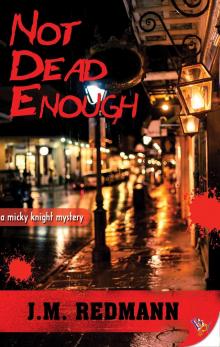 Not Dead Enough
Not Dead Enough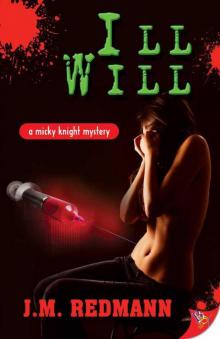 Ill Will
Ill Will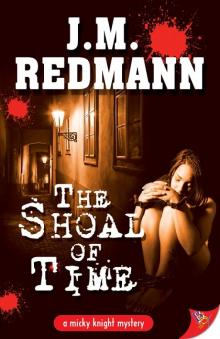 The Shoal of Time
The Shoal of Time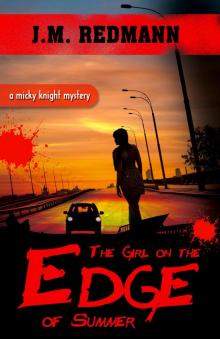 The Girl on the Edge of Summer
The Girl on the Edge of Summer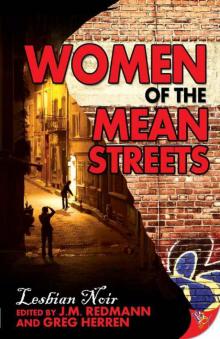 Women of the Mean Streets
Women of the Mean Streets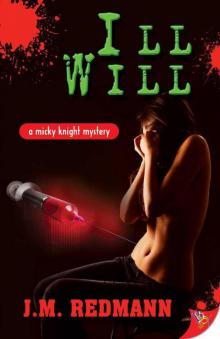 J.M. Redmann - Micky Knight Mystery 7 - I'll Will
J.M. Redmann - Micky Knight Mystery 7 - I'll Will